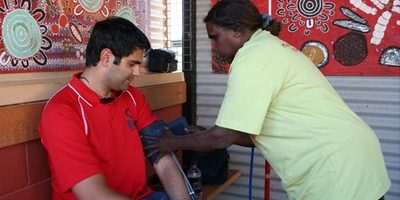
Many Australians At Risk Of Cardiovascular Disease Are Not Receiving Best Practice Care
Many people are not receiving the best possible care when it comes to managing cardiovascular conditions according to two new Australian research studies. The studies highlight the need for wide scale reform to ensure that people at the highest risk of having a heart attack or stroke are identified early and are provided with optimal care. The studies give a comprehensive snapshot of the state of cardiovascular care in the primary health care system for both Indigenous and non-Indigenous Australians.
Around 50% of people over 30 years old did not have sufficient risk factor information recorded to assess their overall risk of a heart attack or stroke. Among people who were assessed as high risk, only 20% were prescribed all recommended treatments in mainstream general practice. A key finding was that patient management was substantially better in Indigenous health care sites, with 44% of Aboriginal and Torres Strait Islander people at high risk being prescribed appropriate medicines.
The research suggests that GPs are still managing individual risk factors such as blood pressure and cholesterol in isolation of one another, and are not adopting recommendations to treat a patient’s overall or absolute risk. Absolute risk management is based on the principle that the major risk factors for cardiovascular disease act together. By taking this approach treatment can be targeted to those most likely to benefit.
"These findings suggest we have not equipped our primary care workforce with the necessary tools to implement best practice standards for preventing cardiovascular disease. It is simply not possible to assess a patient’s overall risk of future heart attack or stroke based on any one risk factor. The current resources available to adequately manage risk are clearly not working", said Dr David Peiris, Senior Research Fellow at The George Institute, GP and an author on both studies.
The studies will be published in tomorrow’s Medical Journal of Australia. The first study examined cardiovascular risk management for adults routinely attending around 100 GPs across Australia. The second study was part of the landmark Kanyini Indigenous health research program and involved a random health record audit for routinely attending Aboriginal and Torres Strait Islander adults in urban, rural and remote Indigenous health services.
"There remains significant gain that can be achieved in reducing the enormous burden of heart disease in our community, simply by identifying and managing risk with the tools and therapies we already have at our disposal. It is also important to note that Aboriginal primary care providers are outperforming mainstream general practice when it comes to identifying and managing risk of heart disease in their respective communities. This is critical in the context of extensive health system reform for all Australians, and suggests that further building on the strengths of primary care is essential for improving chronic disease outcomes", according to Dr Alex Brown, Kanyini Chief Investigator, the Baker IDI Heart and Diabetes Institute.
Cardiovascular diseases remain Australia’s largest health problem and kill one Australian nearly every 10 minutes. Indigenous Australians are 2.6 times more likely to die from heart, stroke and other vascular diseases compared to non-Indigenous Australians and these diseases make a major contribution to the life expectancy gap.
"Early deaths due to heart disease, stroke, diabetes and kidney disease drive the gap in life expectancy for Indigenous Australians. Notwithstanding the important contribution of housing, education and employment to Indigenous health, we can do much to close the gap within the health system. This includes providing better access to the treatments that we know reduce the risk of death," suggests Professor Alan Cass, Kanyini Chief Investigator, The George Institute.
"Two key priority areas in the proposed National Primary Care strategy are to improve chronic disease management and an increased focus on prevention. Innovative tools and strategies are needed to achieve this," added A/Prof Noel Hayman, Medical Director Inala Indigenous Health service, Kanyini Chief Investigator and external reference group member on the National Primary Health Care strategy
Researchers at The George Institute have developed and tested an electronic decision support tool for health practitioners, which analyses patient details and generates an absolute risk assessment and management plan. Importantly, such a tool ensures easier adherence to guidelines. The Baker IDI Heart and Diabetes Institute is developing integrated models of care for vascular disease involving nurse specialist led clinics. In addition to this both institutes are trialling a polypill,(four treatments in one pill) for people at high risk of heart disease or stroke. Easier to prescribe and take, the polypill combines proven risk-reduction medicines into one low cost, easy to administer pill.








